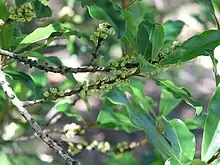| Myrsine howittiana | |
|---|---|
 | |
| Scientific classification | |
| Kingdom: | Plantae |
| Clade: | Tracheophytes |
| Clade: | Angiosperms |
| Clade: | Eudicots |
| Clade: | Asterids |
| Order: | Ericales |
| Family: | Primulaceae |
| Genus: | Myrsine |
| Species: | M. howittiana |
| Binomial name | |
| Myrsine howittiana | |
| Synonyms | |
|
Rapanea howittiana Mez | |
Myrsine howittiana, the brush muttonwood [2] or muttonwood,[3] is a shrub or small tree in the family Primulaceae. The species is endemic to eastern Australia.[2][4]
It grows to between 3 and 10 metres in height and has smooth, often whitish, bark.[3] The buds of new growth are covered with rusty-coloured hairs. The leaves are obovate to elliptic in shape and between 4 and 13 cm long and 2 to 4 cm wide.[2] These are shiny with wavy edges and a duller undersurface and have petioles that are 7 to 14 mm in length.[2] Greenish-white to cream flowers are produced in spring and summer.[2] These are followed by blue or mauve fruits which are 5 to 7 mm in diameter and ripen between December and June.[2]
The species is pollinated by a thrips (thunderfly), Thrips setipennis.[5] The species occurs from southern Victoria (37° S), northwards through New South Wales to Fraser Island (25° S) in Queensland often in areas where rainforest interfaces with moist open forest.[2]
References
- ↑ "Myrsine howittiana (F. Muell. ex Mez) Jackes". The Plant List. Retrieved 30 July 2013.
- 1 2 3 4 5 6 7 "Myrsine howittina". PlantNET - New South Wales Flora Online. Royal Botanic Gardens & Domain Trust, Sydney Australia. Retrieved 18 December 2008.
- 1 2 Costermans, L. (1981). Native Trees and Shrubs of South-eastern Australia. Australia: Rigby. ISBN 978-0727014030.
- ↑ "Myrsine howittiana". Australian Plant Name Index (APNI), IBIS database. Centre for Plant Biodiversity Research, Australian Government, Canberra. Retrieved 30 July 2013.
- ↑ Williams, G. A.; Adam, P.; Mound, L. A. (1 January 2001). "Thrips (Thysanoptera) pollination in Australian subtropical rainforests, with particular reference to pollination of Wilkiea huegeliana (Monimiaceae)". Journal of Natural History. 35 (1): 1–21. doi:10.1080/002229301447853.